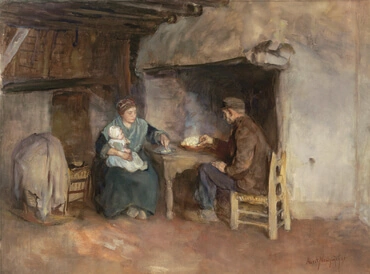1
And thou, son of man, prophesy concerning Gog, and thou hast said: Thus said the Lord Jehovah: Lo, I [am] against thee, O Gog, Prince of Rosh, Meshech, and Tubal,
2
And have turned thee back, and enticed thee, And caused thee to come up from the sides of the north, And brought thee in against mountains of Israel,
3
And have smitten thy bow out of thy left hand, Yea, thine arrows out of thy right I cause to fall.
4
On mountains of Israel thou fallest, Thou, and all thy bands, and the peoples who [are] with thee, To ravenous fowl -- a bird of every wing, And [to] a beast of the field, I have given thee for food.
5
On the face of the field thou fallest, for I have spoken, An affirmation of the Lord Jehovah.
6
And I have sent a fire against Magog, And against the confident inhabitants of the isles, And they have known that I [am] Jehovah.
7
And My holy name I make known in the midst of My people Israel, And I pollute not My holy name any more, And known have the nations that I, Jehovah, the holy One, [am] in Israel.
8
Lo, it hath come, and it hath been done, An affirmation of the Lord Jehovah, It [is] the day of which I spake.
9
And gone out have the inhabitants of cities of Israel, And they have burned and kindled [a fire], With armour, and shield, and buckler, With bow, and with arrows, And with hand-staves, and with javelins, And they have caused a fire to burn with them seven years,
10
And they do not take wood out of the field, Nor do they hew out of the forests, For with armour they cause the fire to burn, And they have spoiled their spoilers, And they have plundered their plunderers, An affirmation of the Lord Jehovah.
11
And it hath come to pass, in that day, I give to Gog a place there -- a grave in Israel, the valley of those passing by, east of the sea, and it is stopping those passing by, and they have buried there Gog, and all his multitude, and have cried, O valley of the multitude of Gog!
12
And the house of Israel have buried them -- in order to cleanse the land -- seven months.
13
Yea, all the people of the land have buried them, and it hath been to them for a name -- the day of My being honoured -- an affirmation of the Lord Jehovah.
14
And men for continual employment they separate, passing on through the land, burying with those passing by those who are left on the face of the earth, to cleanse it: at the end of seven months they search.
15
And those passing by have passed through the land, and seen a bone of man, and one hath constructed near it a sign till those burying have buried it in the valley of the multitude of Gog.
16
And also the name of the city [is] The multitude; and they have cleansed the land.
17
And thou, son of man, thus said the Lord Jehovah: Say to the bird -- every wing, and to every beast of the field: Be assembled and come in, Be gathered from round about, For My sacrifice that I am sacrificing for you, A great sacrifice on mountains of Israel, And ye have eaten flesh, and drunk blood.
18
Flesh of the mighty ye do eat, And blood of princes of the earth ye drink, Of rams, of lambs, and of he-goats, Of calves, fatlings of Bashan -- all of them.
19
And ye have eaten fat to satiety, And ye have drunk blood -- to drunkenness, Of My sacrifice that I sacrificed for you.
20
And ye have been satisfied at My table with horse and rider, Mighty man, and every man of war, An affirmation of the Lord Jehovah.
21
And I have given My honour among nations, And seen have all the nations My Judgment that I have done, And My hand that I have laid on them.
22
And known have the house of Israel that I [am] Jehovah their God, From that day and henceforth.
23
And known have the nations that for their iniquity, Removed have the house of Israel, Because they have trespassed against Me, And I do hide My face from them, And give them into the hand of their adversaries, And they fall by sword -- all of them.
24
According to their uncleanness, And according to their transgressions, I have done with them, And I do hide My face from them.
25
Therefore, thus said the Lord Jehovah: Now do I bring back the captivity of Jacob, And I have pitied all the house of Israel, And have been zealous for My holy name.
26
And they have forgotten their shame, And all their trespass that they trespassed against Me, In their dwelling on their land confidently and none troubling.
27
In My bringing them back from the peoples, I have assembled them from the lands of their enemies, And I have been sanctified in them before the eyes of the many nations,
28
And they have known that I [am] Jehovah their God, In My removing them unto the nations, And I have gathered them unto their land, And I leave none of them any more there.
29
And I hide not any more My face from them, In that I have poured out My spirit on the house of Israel, An affirmation of the Lord Jehovah!'







